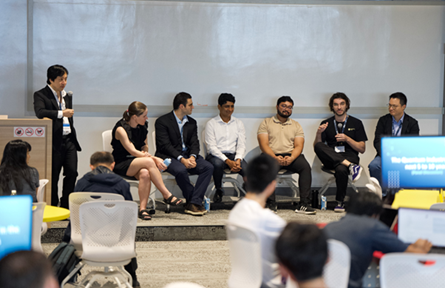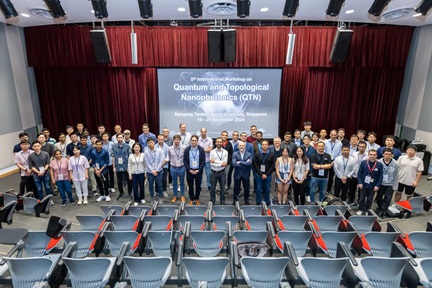Nobel Laureate and Fields Medallist Public Lecture by Prof Brian Kobilka and Prof Wendelin Werner
Partner event of the Global Young Scientists Summit (GYSS) 2023
With the Chinese Lunar New Year just over the horizon, we are privileged to have the opportunity to learn from two distinguished speakers, Prof Brian Kobilka and Prof Wendelin Werner, who are highly respected and accomplished scientists in their respective fields. Prof Kobilka, Nobel Prize in Chemistry 2012, is the Professor of Molecular and Cellular Physiology at Stanford University School of Medicine. Prof Wendelin Werner, Fields Medallist 2006, is Professor of Mathematics at ETH Zürich.

[From left] Assoc Prof Tan Meng How (Assoc Chair, Students & Continuing Education, CCEB), Prof Zhao Yanli (Assoc Chair, Research & Graduate Education, CCEB), Prof Juan-Pablo Ortega (Assoc Chair, Faculty, SPMS), Fields Medallist Prof Wendelin Werner, Prof Phan Anh Tuan (Chair, SPMS), Nobel Laureate Prof Brian Kobilka, Dr Tong Sun Kobilka and Prof Sum Tze Chien (Director, IAS).
Sponsored by Lee Foundation, the public lecture was held as a partner event of the Global Young Scientists Summit organised by the Singapore National Research Foundation. Held on 18 January 2023 at the Tan Chin Tuan Lecture Theatre, the event was attended by close to 300 attendees. Prof Sum Tze Chien, Director of IAS, delivered a welcome address, followed by opening remarks from Prof Phan Anh Tuan, Chair of SPMS NTU.
Prof Brian Kobilka’s lecture was titled “Structural Insights into G Protein Coupled Receptor Activation: Implications for Drug Discovery”, which was the amazing work that let him to achieve the 2012 Chemistry Nobel Prize, along with Prof Robert Lefkowitz. He shared briefly about his own background and how he eventually went into science. The journey towards the discovery of the inner workings of G-protein Coupled Receptors was not smooth-sailing, especially with the limitations of science and technologies back in the 20th century. For the longest time, it has been a mystery as to how cells could react with their environment. In 1968, Prof Lefkowitz began to use radioactivity to trace cells’ receptors via the attachment of an iodine isotope. Fortunately, he was able to uncover various receptors and one of it is the β-adrenergic receptor. His research team eventually extracted it and gained an insight of the workings of this receptor. In the 1980s, Prof Brian Kobilka joined Prof Lefkowitz’s group and successfully isolated the gene that codes for the β-adrenergic receptor. When they analysed the gene, they also discovered that the receptor was similar to one of the receptors in the eye that captures light. Eventually, it was later known that this family of receptors look and act in similar ways, now referred as G-protein-couple-receptors. Their research on this kind of receptor have contributed to approximately half of all medications used today. Furthermore, in 2011, Prof Kobilka achieved another breakthrough by capturing an image of the exact point where the β-adrenergic receptor is activated by a hormone and sent a signal into the cell.

Prof Brian Kobilka's enlightening talk on his breakthrough research in G Protein Coupled Receptor.
During the Q&A session, there were several intriguing questions asked such as the use of camelid antibody fragments (nanobodies), that only has the heavy chain, to stabilise the active state of GPCR structures, instead of the conventional antibodies that has light and heavy chains. Prof Kobilka shared that through trial and error, they managed to find the most suitable ones to stabilise the active conformation via a series of binding assays to ascertain the stability. Another question was asked how did becoming a researcher from a practical doctor impacted him in any ways. Prof Kobilka replied, “If I wasn’t a physician, I would probably not be in the field.”
The talk by Prof Wendelin Werner was titled “A Journey Towards a Research Topic”. He began his lecture by bringing out his blackboard and said, “Mathematicians don’t like PowerPoint presentations.” His talk was filled with a lot of humor which brought about joy and laughter in the audience circle, with his unique approach of thinking. He emphasised how important one’s interests are and how they can be shaped into creative ideas and passionate work. He shared a number of experiences that were a great source of motivation for the audience and were great examples of how honest research work pays in more ways than just money. Prof Werner highlighted that “finding a fitting research topic can be a highly personal journey”.

Prof Wendelin Werner engaging the audience with his blackboard presentation on probability theory.
While the title of the lecture was along general lines of pursuing research, Prof Werner creatively made smooth transitions into details of his work on probability theory and highlighted some important results of his work. He gave a general overview of
a few elements of probability theory, and it was quite intriguing how he captured the rigorous concepts of the theory in simple words while presenting them to the general audience. One of the most fascinating conclusions he presented was that
for a shape drawn out of random paths, the outline of the shape is an invariant. Several interesting questions were asked during the Q&A session such as sourcing for funding and resources in the field of Mathematics.

Prof Phan Anh Tuan presenting mementos to Prof Kobilka and Prof Werner.
Both the engaging and interactive lectures by Prof Kobilka and Prof Werner were received with a big round of applause from the audience. Their anecdotal life stories and the great journey towards achieving their goals were inspiring.
Written by: Evelias Yan | Masters Student, School of Chemistry, Chemical Engineering and Biotechnology, NTU and
Arora Arpit | PhD student, School of Physical and Mathematical Sciences, NTU
****
Reflection by Joshua Chan | Undergraduate Year 3, Division of Mathematical Sciences, SPMS, NTU:
"It’s a very rare and precious opportunity to attend a talk delivered by Nobel Prize and Fields Medal awardees. I personally benefitted a lot from hearing their research journey, because it helps me decide the direction for my future postgraduate studies. Research is never a journey on my own; it needs a community to support. In NTU I heard many successful stories of young researchers nurtured locally, and through this talk I gained perspective of research experiences overseas. I hope there will be more similar talks in the future as they’re very beneficial to students."














/enri-thumbnails/careeropportunities1f0caf1c-a12d-479c-be7c-3c04e085c617.tmb-mega-menu.jpg?Culture=en&sfvrsn=d7261e3b_1)

/cradle-thumbnails/research-capabilities1516d0ba63aa44f0b4ee77a8c05263b2.tmb-mega-menu.jpg?Culture=en&sfvrsn=1bc94f8_1)






